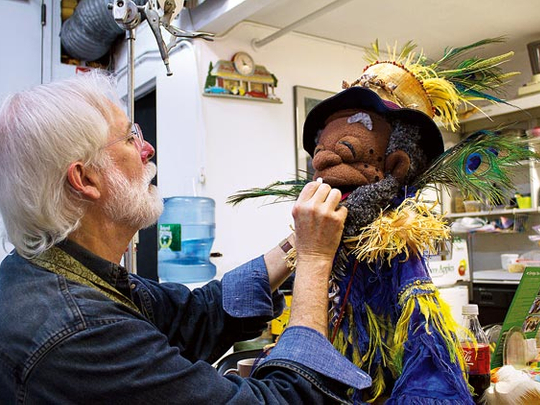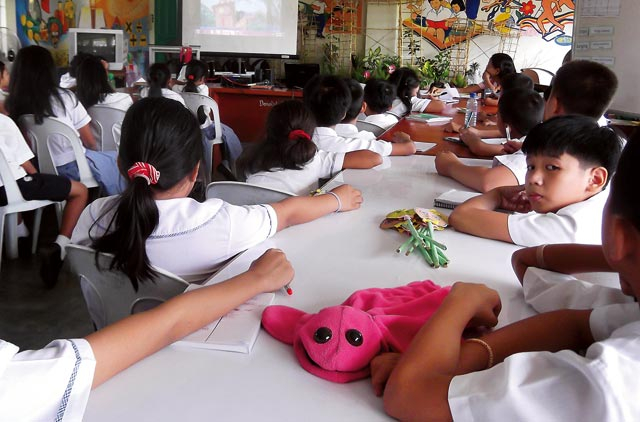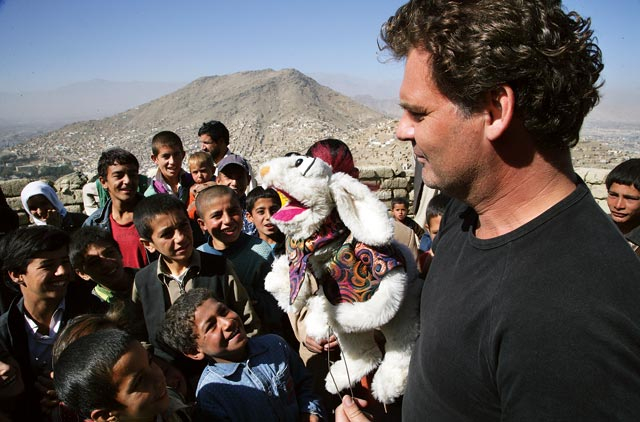
For ten years before Johnie McGlade set up a groundbreaking puppet charity he carried a scruffy glove puppet to war and disaster zones across the world. Working in emergencies from South Sudan to Afghanistan and Somalia to Angola, in floods, famines and refugee camps, he was never without Seamus, a goggle-eyed dog with a fluffy mane.
“I took Seamus on the first ever assignment I went on in 1993, to camps of malnourished children in South Sudan,” Johnie, 46, says. “I’d brought him as a bit of entertainment around the fire with the other aid workers, but I soon found he had better uses. He had this amazing ability to bring a bit of laughter, even among starving children, and to help get the feeding done. Kids listened to Seamus and, more surprisingly, adults did, too.”
In the war zone of South Sudan, Johnie was working in what became known as the Triple A Camps, home to 250,000 people escaping the bombs and militia attacks of the civil war. As crops burned and families died, famine swept through the region.
Johnie, who was born in Belfast and grew up in Cork, Ireland, worked for Goal – a charity that helps poor and vulnerable people around
the world and feeds people on a mass scale.
“The kids in the camps had never seen a puppet before,” says Johnie. “They listened to him when they wouldn’t have listened to me. And even aggressive rebel soldiers seemed to find him disarming. They’d smile and stand aside if Seamus told them to.”
By 2003 Johnie was a veteran of some of the most challenging and violent conflicts of the Nineties and head of emergencies at War Child – an organisation that provides help to children in areas of conflict and post-conflict. When a friend saw Seamus in one of Johnie’s photographs from the field, she was intrigued.
“She said, ‘Tell me about the puppet, what’s he doing there?’” Johnie recalls. “It turned out that her godparents were Kathy Mullen and Michael Frith – the people behind some of the world’s most famous puppets such as Animal, Gonzo and Fozzie Bear of The Muppet Show. They wanted to use their skills to help with international aid for years but didn’t know how.”
A few weeks later Johnie flew to New York to meet Kathy and Michael. The meeting was a success and they decided to use puppets to make children’s films with life-saving messages, such as the danger of landmines and how to protect themselves during natural disasters like flooding and landslides.
Soon after that Johnie was walking on a beach in Wales with his great friend and mentor Bill Leeson, the founder of War Child, when he had an idea: No Strings – a charity using puppetry to save children’s lives.
The best in the business
In the ten years since No Strings was founded it has created educational films for children in dozens of languages using some of the world’s best puppeteers.
Whether it is teaching kids the signs of an approaching tsunami, how to survive an earthquake, about HIV and Aids or even child abuse, every film engages young minds through inventive storytelling using indigenous characters and local languages.
“The film is only part of the process,” says Johnie. “Each one comes with a programme where we teach hundreds of trainers – and trainers of trainers – how to use the films, use the puppets and teach the material.”
The films are in a range of languages from Khmer, spoken in Cambodia, to Pashtun, spoken in Iran and Afghanistan, and set in places including Myanmar, Indonesia, Haiti sub-Saharan Africa.
No Strings’ films are even part of the national curriculum in the Philippines, where primary and secondary school teachers are using them to educate thousands of children every week on what to do in case of natural disasters like floods or earthquakes.
Elsewhere the films are used by some of the world’s leading non-governmental organisations including Unicef, Oxfam GB, Save the Children, CRS, Trócaire and child rights organisation Plan International.
“The people we use are the best in the world,” Johnie says. “Michael is an outstanding puppet designer – he designed Miss Piggy, Fozzy Bear and Animal on The Muppet Show as well as iconic characters for Dr Seuss. He was an executive vice-president and director of creative services on The Muppet Show and created Fraggle Rock.
“Kathy is a legendary puppeteer,” he says. “She is known for The Muppet Show, but also for operating Yoda with Frank Oz in the pre-CGI era of Star Wars. They and others donate huge amounts of time every year to make our films happen.” Kathy, Michael and celebrity patrons like Neil Morrissey (best known for his role as Tony in Men Behaving Badly) and actor and director Hugo Speer regularly visit No Strings’ projects. “They are patrons who get their hands dirty and support our work in the field.”
Johnie says he will never forget the first film No Strings made in 2006 for children in Afghanistan – a lesson about the dangers of landmines and unexploded cluster bombs in the form of a puppet story. At a time when hundreds of children a year were being killed or maimed by the vicious debris of war, this made a huge difference.
“Kathy and Michael used a puppet conference in Connecticut to get the first film made,” Johnie explains. “It was an incredible moment. Films had been banned under the Taliban and lots of kids had never seen TV or radio. We showed our little film about landmines featuring our puppets in Pashtun. The children were totally enthralled. That’s when we knew the power of our films and that they had tremendous potential.”
The films have been shown in some of the most remote places on the planet using eRangers, specially adapted motorbikes with sidecars often used by aid agencies as ambulances.
“We asked eRanger to donate a mobile cinema and they gave us several of these extraordinary bikes,” Johnie says. “The sidecar folds out to become a cinema screen.”
Robert Deacon Elliott, eRanger’s chair of the board, is based in Dubai. Johnie says that No Strings often uses Dubai as a hub to work from. “We will be beginning a project in Syria very soon, bringing our films to help children traumatised by war, and we are planning a fund-raising drive in Dubai,” he says.
A world away from wealth
Johnie hadn’t originally intended to be an aid worker. He trained in hotel management at Killybegs, a prestigious catering college in Donegal, where he also trained as a chef.
As a teenager he had planned to emigrate to New Zealand and he had got as far as London when he saw an advert for a job vacancy for a chef based in the Cayman Islands.
He got the job and stayed there for six years – apart from a brief sojourn to Australia where he worked as a sous chef at the Opera House – and loved the lifestyle, but was always acutely aware that there was another world away from the wealthy islands.
Both his sister Afric and brother Barney worked for Goal – Afric in South Sudan as a nurse and Barney in the Philippines helping people with disabilities. Inspired by this, Johnie began fund-raising for Goal among the islanders. “It started with a gig here and a rugby match there, but we got really good at it. We raised around £600,000 [Dh3,313,362].”
His efforts were noted by John O’Shea, Goal’s CEO, who sent him to South Sudan for three months to work as a logistician and witness the agency’s work for himself.
“He thought it would help inspire me to raise even more money and to be able to tell people what I had seen,” says Johnie. In fact, it was a life-changing experience for him. “I was pretty anxious about going,” he admits. “But I thought, ‘well it’s three months of my life and then I can say I was an aid worker.’
“My bosses in Cayman gave me the time off. Then suddenly I was there, flying in one of those wee planes that I still hate into South Sudan. We touched down on a grass airstrip and made the 40 kilometre journey to Loa.
“That night I sat around the fire with good people – some who would go on to become my best friends. I looked at the work and I knew I was going to do that for the rest of my life.”
Tough going
Johnie had only been through a short training course in Dublin and at first the work was overwhelming. “When we first reached the camps there were hundreds of people dying from starvation all the time,” he says. “Every day the bodies piled up, and one of my jobs was to mark each with chalk to make sure we didn’t count them twice. We were surrounded by so much death.
“With the feeding programme we managed to get the deaths down to half a dozen a day. We could see the difference we’d made.”
Johnie’s three-month plan quickly turned into eight. “I never went back to Cayman,” he says. “I was in Sudan from March to October 1993, and from there I went on to Somalia.”
He then returned to South Sudan, then Angola as head logistician and then field director. “I remember one town where there were 40,000 displaced people and not a single charity to help them. We just got stuck in.”
In May 1997 Goal sent Johnie to England to set up its London office. “Then War Child offered me a job,” says Johnie. He became its head of emergencies, returning to South Sudan via Kosovo, Rwanda, Kenya, DRC, East Timor, Albania, Bosnia, Sudan, Guatemala, El Salvador, Honduras, Afghanistan, Pakistan and Palestine.
These days he and No Strings are based in Newcastle, UK, where he lives with his wife Rosie – a journalist who he met when she was interviewing him for a magazine – and step-son Bryn. New films are already in design for viewers as diverse as Syrian children and a new project among the Karamojong tribe in Uganda.
Seamus no longer travels in Johnie’s rucksack when he heads off from Newcastle to the latest emergency. “Seamus is in tatters now,” Johnie says. “My mother put him in the washing machine and he’s not been the same since – he is just a ball of wool. I asked Kathy and Michael if they could fix him, but they have given me much, much more than that.”














